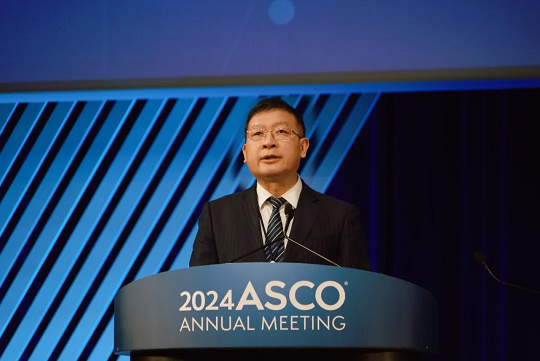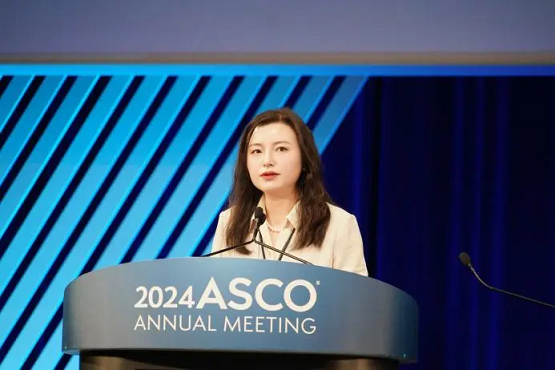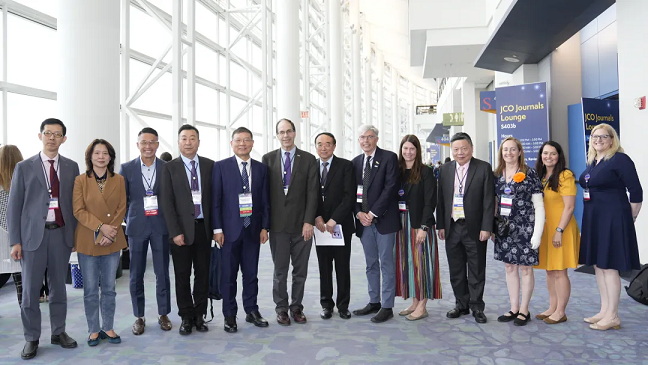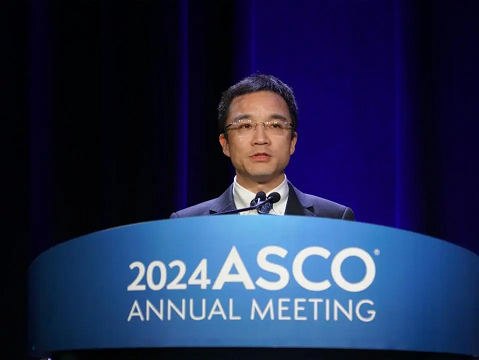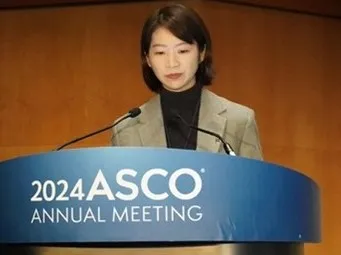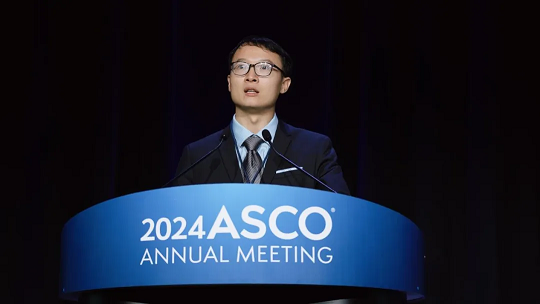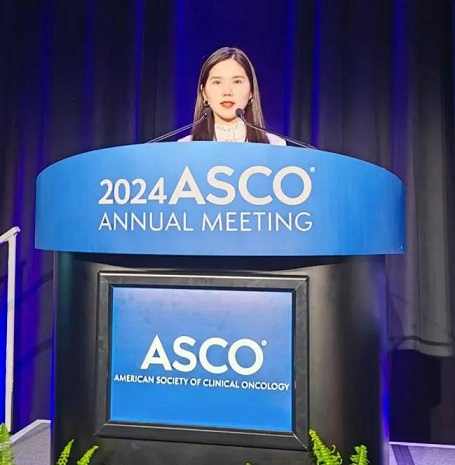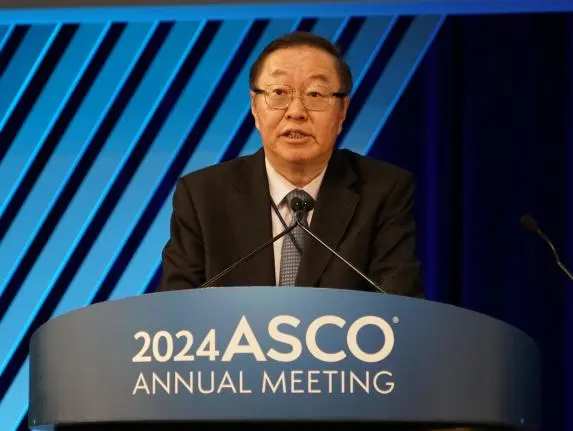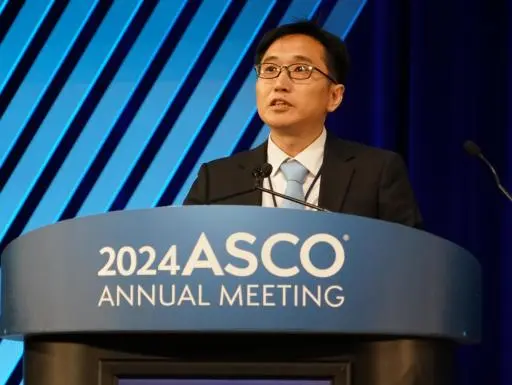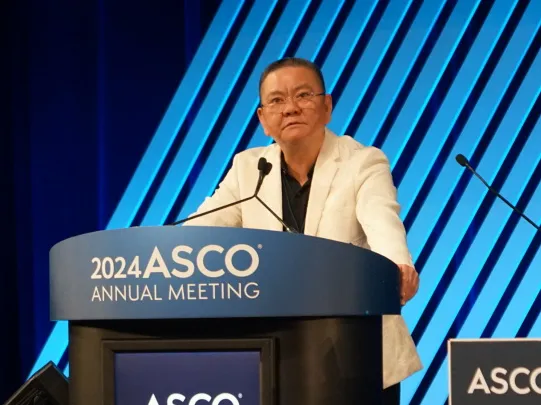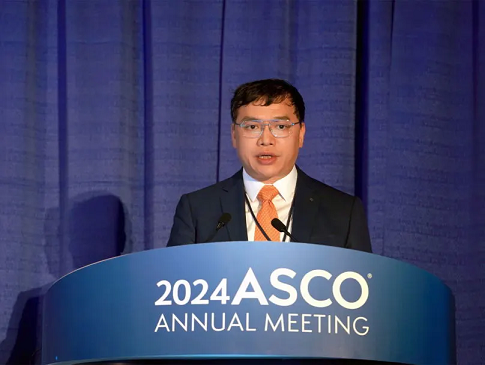As one of the most significant gatherings of oncology professionals worldwide, the 2024 ASCO (American Society of Clinical Oncology) Annual Meeting was held from May 31 to June 4 in Chicago, the United States, featuring over 200 sessions across the spectrum of disease.
Over 50 studies from China were presented during the ASCO 2024, with 13 presented by physician-scientists and researchers of Sun Yat-sen University Cancer Center (SYSUCC).
At ASCO 2024, scholars from SYSUCC shared their latest research findings on treatment strategies for gastrointestinal cancer (GI cancer), head and neck cancer, lung cancer, sarcoma, and gynecologic cancer. Prof. Xu Ruihua, president of SYSUCC, presented two studies on GI cancer.
During the ASCO Plenary Series on June 1, six studies featuring practice-changing data were presented at Rapid Abstract Updates Session, three of which were presented by Chinese scholars, and that two of which were from Prof. Xu’s team.
Prof. Xu gave oral report on trial of CMG901 a claudin 18.2 - targeting antibody-drug conjugate (ADC) in patients with advanced gastric or gastroesophageal junction Cancer.
Prof. Xu Ruihua
Prof. Wang Feng introduced the research titled “Fruquintinib Plus Paclitaxel Versus Paclitaxel as Second-Line Therapy for Patients with Advanced Gastric or Gastroesophageal Junction Adenocarcinoma”.
Prof. Wang Feng
Prof. Eric Small, the President-Elect of ASCO, appreciated these two studies from SYSUCC as an admirable achievement, in his talk with Prof. Xu after the meeting.
Experts pose for a group photo at ASCO 2024. The fifth from left is Prof. Xu Ruihua,
and the sixth from left is Prof. Eric Small
On June 2, in the oral abstract session, Gastrointestinal Cancer - Colorectal and Anal, Prof. Xu presented a study on neoadjuvant treatment strategy of IBI310 (anti-CTLA-4 antibody) plus sintilimab (anti-PD-1 antibody) in patients with microsatellite instability-high/mismatch repair-deficient colorectal cancer. His talk attracted significant attention from the oncology community, and the ASCO Daily News conducted an interview with Prof. Xu about the study. (
Read more)
In addition, Prof. Qiu Haibo and Prof. Ruan Danyun, both from Prof. Xu’s team, presented their studies at the oral abstract session on sarcoma as well as the quick oral abstract session on head and neck cancer.
Prof. Qiu Haibo
Prof. Ruan Danyun
On June 4, two studies on nasopharyngeal carcinoma from SYSUCC were selected for oral presentations. Dr. Liu Xu from Prof. Ma Jun’s group presented the DIPPER study in the oral abstract session on head and neck cancer, which was selected as a late breaking abstract.
Recognized as “Best of ASCO”, the DIPPER study is the first to demonstrate the value of adjuvant immunotherapy in locally advanced nasopharyngeal carcinoma, providing new treatment options for these patients.
Prof. Liu Xu
In the same session, Prof. Liu Sailan, from Prof. Mai Haiqiang and Prof. Chen Qiuyan’s team, presented the BEACON study, which is the first reported phase III clinical study of immune induction therapy in locally advanced nasopharyngeal carcinoma. Continued research is being conducted to assess its long-term efficacy and safety.
Prof. Liu Sailan
For the treatment of non-small cell lung cancer (NSCLC), four studies from SYSUCC were reported in two oral abstract sessions. The HARMONi-A study, presented by Prof. Zhang Li in the Lung Cancer—Non-Small Cell Metastatic Session, provided new immunotherapy treatment options for patients with EGFR-mutant NSCLC who had failed EGFR-TKIs treatments.
Prof. Zhang Li
In the same session, Prof. Fang Wenfeng reported the results of the OptiTROP-Lung01 study, highlighting the treatment efficacy of the combination of TROP2 ADC and anti-PD-L1 monoclonal antibody in treatment-naive patients with advanced NSCLC.
Prof. Fang Wenfeng
In another Lung Cancer session on June 3, Prof. Liu Hui reported the results of the GASTO-1091 study, demonstrating the efficacy and safety of the combination of hypo-CCRT (hypofractionated radiotherapy and concurrent chemotherapy) and immunotherapy in patients with unresectable stage III NSCLC.
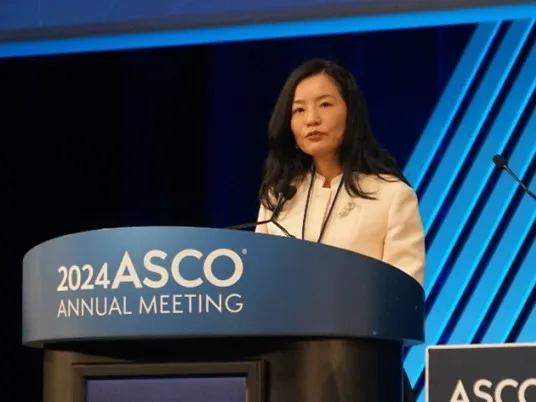
Prof. Liu Hui
Additionally, Prof. Wang Siyu presented the results of the ICTAN study, which showed that first-generation EGFR-TKI adjuvant therapy can bring overall survival benefits to patients with completely resected stage II-IIIA NSCLC.
Prof. Wang Siyu
In a rapid oral abstract session on gynecological cancer, Prof. Liu Jihong presented the latest result of neoadjuvant therapy in patients with locally advanced cervical cancer.
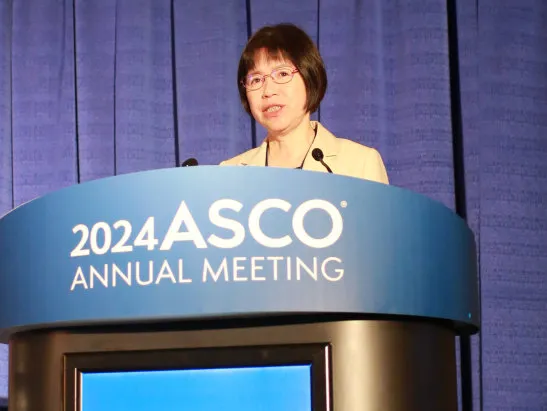
Prof. Liu Jihong
At the Clinical Science Symposium, Prof. Song Ming from SYSUCC presented his research. He reported a new treatment strategy of neoadjuvant immunochemotherapy followed by sequential transoral robotic surgery in patients with resectable HPV+ oropharyngeal cancer.
Prof. Song Ming
Over the last decade, clinical research in China has flourished. "Ten years ago, it was still rare for Chinese scholars to give oral presentations at ASCO conferences, but now it is very common,” said Prof. Xu Ruihua. “In terms of quantity, the number of China’s oral presentations at ASCO conferences has ranked second in the world, only behind the United States."
Recently, researchers from SYSUCC published multiple important research results in top medical journals, including
the BMJ, the Lancet, JAMA, and
Nature Medicine, which reflect the significant progress of clinical oncology in China. These studies have not only revolutionized cancer treatment practices in China but have also sparked significant transformations worldwide.
Written by: Liao Shuang, Zhai Huiwen, Sun Yat-sen University Cancer Center
Source: SYSU NEWS
Link to the original report at SYSU NEWS
